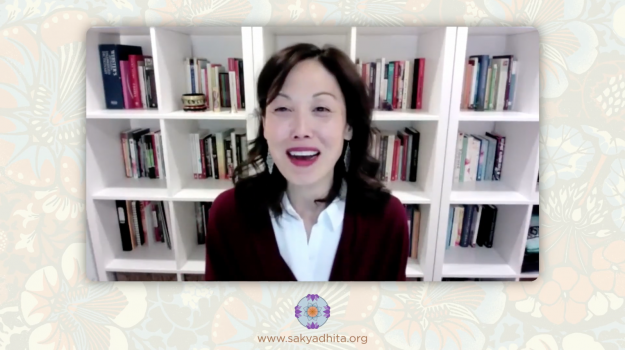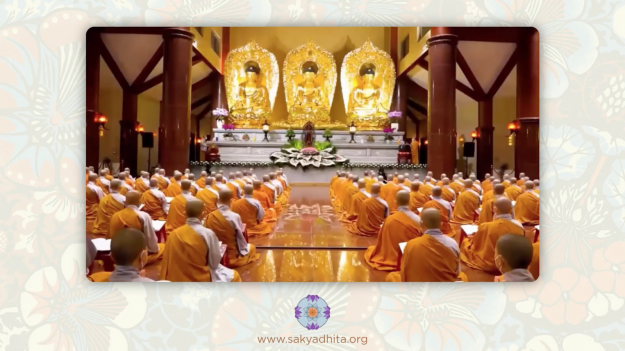The Sakyadhita International Association of Buddhist Women hosted its 17th conference in late December for the first time since the global pandemic began in 2019. Although originally scheduled to take place in the state of Sarawak in Malaysia, conference organizers had to pivot to an online format for the first time due to safety concerns around the ongoing COVID-19 pandemic. Over 1,000 monastics, laypeople, scholars, and practitioners gathered online to explore the conference’s theme of “Buddhist Women Beyond Boundaries: Interfaith, Interdependence, Environment” through an array of panels, talks, and workshops.
“The pivot to the online format went remarkably well,” commented Sakyadhita President Sharon Suh. “We managed to maintain intimacy among participants and keep with much of the traditional ceremonial opening and closing remarks, chants, and performances.”
Sakyadhita, which means “daughters of the Buddha,” is a trailblazing organization recognized for advocating for the welfare of women in Buddhist institutions around the world. For over thirty years, the Sakyadhita Conference has convened biannually to address gender equality issues in Buddhism and confront other social injustices that impact the lives of Buddhist women. The first conference, which took place in 1987 in Bodhgaya, India, brought together over 1,500 people to discuss gender discrimination of Buddhist nuns who were, on the whole, afforded less status, education, and access to leadership positions compared to monks.
The Sakyadhita Association continues to support groundbreaking research and center leaders that advocate for the wellbeing of Buddhist women. Its conferences encourage women to see beyond cultural and national identities in order to share both mutual values and unique experiences as Buddhist women. The 16th Sakyadhita Conference, “New Horizons in Buddhism,” took place in Australia in June of 2019 at the height of the #MeToo movement. The presentations at the conference demonstrated an unprecedented willingness to confront sexual misconduct in Buddhist communities. This new level of honesty and openness about sexual abuse within Buddhist sanghas encouraged more Buddhist women to enter the global conversation about sexual abuse and question the ethics around complete devotion to teachers who are fallible humans.
The themes of this year’s conference spoke to the urgency around intersecting social injustices that feed the cascading effects of the current global crisis. Lectures and roundtable discussions centered around gender bias in Buddhism, the importance of recognizing our interdependence, interfaith collaboration, bioethics, and environmental justice. Participants could also attend a “Discussion Circle for Female Buddhist Leaders” as well as workshops in sacred spiritual dances, origami, and interdisciplinary explorations of movement and architecture.

In the opening remarks of this year’s conference, Suh recalled an experience in graduate school where she shared her interest in researching women, gender, and Buddhism with her advisor. Her advisor replied, “Gender? What gender in Buddhism?”
There is a tendency in the West to regard Buddhism as neutral when it comes to gender. However, in many Asian countries with significant Buddhist populations, men tend to dominate the sanghas, leaving women to play secondary roles.
For example, Amnuaypond Kidpromma, a lecturer in the Department of Philosophy and Religion at Chiang Mai University in Thailand, presented her research on the relationship between female sex workers and Theravada Buddhism as practiced in Northern Thailand. Kidpromma argued that Buddhism and religious piety play a complex role in the lives of sex workers in a country where 96 percent of the population is Buddhist.
Through interviews with sex industry workers, Kidpromma discovered that many women enter the sex trade due to limited opportunities for employment and so they can fulfill their spiritual duties to their parents. She explained how Theraveda Buddhist women in Thailand cannot be ordained and the Buddhist belief system obligates women “to pay gratitude to their parents.” On the other hand, men can accumulate power and status through ordination and generally aren’t expected to contribute to the financial wellbeing of their parents to the same extent.
Kidpromma argued that Theravada Buddhism as practiced in Thailand has put women in a bind. Although a job as a sex worker enables women to accumulate spiritual merit by providing a means of support for their parents, the job also carries a sense of stigma in Thai culture, as sex work is illegal in Thailand and generally considered immoral. Women join the sex trade in order to be a “good Buddhist,” only to be made to feel like a “bad Buddhist” for working in a profession that is seen as dirty or unethical.
To alleviate shameful feelings and accumulate merit for the next incarnation, many of the Thai women Kidpromma interviewed said they regularly offer donations, or dana, to their Buddhist temples. In this way, Kidpromma asserts that Buddhism and the sex industry can be viewed as mutually supportive in Thailand, as many Buddhist women fulfill their spiritual duties by entering the sex trade and Buddhist institutions financially benefit from donations of women’s earnings from sex work. For these reasons, Kidpromma suggests the stigmatization and marginalization of female sex workers in Buddhist communities in Thailand is unfair and unjust.
In another illuminating talk, Sonam Choden Sherpa, who has formal training in Women-Centered Practices from Tata Institute of Social Sciences in Mumbai, India, presented research that highlighted the need for greater advocacy and access to health education and health services for monastic women in the Tibetan tradition living in Sikkim, India. Choden’s research revealed that the nuns living in Sikkim have very limited knowledge of menstrual health and hygiene as compared to other women in the area, and they lack access to community health education programs on this subject. “The nuns are often educated with the traditional view that menstrual blood is a polluting substance and that female biological processes are dirty,” Choden said.
Choden also discovered that Indian healthcare workers were biased when it came to providing healthcare to female Buddhist monastics. For example, nuns in Sikkim don’t receive the HPV vaccine even though it’s known to prevent ovarian cancer. “The healthcare workers reasoned that the Buddhist nuns didn’t need the vaccine because they weren’t planning to marry,” Choden explained. “Their individual health is not taken into consideration.”
During another paper talk session on the environment and bio-ethics, Gurmeet Kaur, a Senior Research Fellow at Department Cum Centre for Women’s Studies and Development at Panjab University, presented her research on the relationship between traditional Buddhist teachings and bioethical issues that relate directly to gender.
Her lecture examined the bioethics of abortion from a Buddhist perspective. “The Western debate centers around a woman’s right to choose what happens to her body,” Kaur said. “But Buddhism doesn’t traditionally offer proprietary rights of the fetus to the mother.” While many feminists recognize the bodily autonomy of women when it comes to abortion, Buddhism, by and large, opposes abortion. In this instance, Kaur suggested that feminism and Buddhism are not aligned.
“In Buddhism, incarnation is not considered an easy matter, and therefore every life is an opportunity. The mother has nothing to do with it.” Kaur said that the scriptures state the Buddha believed that life began at conception and many Buddhist scholars consider abortion to be a form of killing that violates the first of the Five Precepts. Additionally, convincing a woman to have an abortion is named as one of the Four Transgressions or Disrobing Offenses.
Kaur points out that in Buddhist-majority countries, national policies are decided by committees of religious scholars and scientific experts. “The work of Buddhist ethicists and Buddhist scholars display a remarkable lack of urgency to include women’s voices in the decision-making process,” Kaur observed. Yet, many of the bioethical issues of our time, such as abortion, fertility, cosmetic surgery, adoption, and surrogacy, relate directly to gender and sexuality. Kaur’s talk introduces a dilemma for Buddhist feminists who believe that patriarchy or male domination of society is morally wrong and that women have the right to make their own choices about their bodies and wellbeing.
Still, the lecture closed on an aspirational note. Kaur concludes that Buddhism, with its emphasis on moral conduct (or sila), has ample room for the growth of an explicitly feminist spirituality, one that gives equal value to women’s lived experiences and uses them as the foundation for individual and societal development.

The efforts and advocacy of the Sakyadhita Association have helped advance the conversation and research around gender and Buddhism. The topics at the 17th Sakyadhita Conference continued to push forward, addressing the reality of gender bias and inequity in Buddhist institutions, as well as celebrating and elevating the work and contributions of many female Buddhist scholars, activists, artists, and teachers.
The 18th Sakyadhita Conference is scheduled to take place in South Korea in 2023.